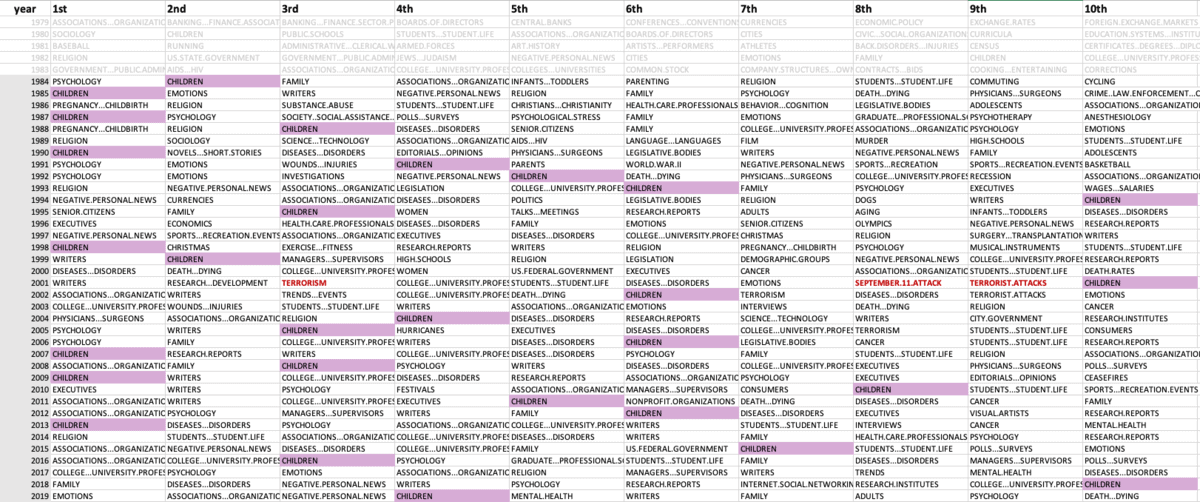As introduced in the last post, my project examines the discourse of personal control in published newspaper articles from 1979 to 2019. I am interested in 1) exploring the different life aspects in which people discuss sense of control and their variation in prevalence over time; 2) concepts that people consider similar or related with sense of control and the time variation; and 3) the specific ways people use the term to discuss other topics, as well as how the usages change over time. The overall goal is to understand the varying meanings and significance of personal control to different individuals and how the meanings shifts by time.
Popular Topics Associated with Sense of Control
Since the last post, I am able to use subject labels generated by the database based on each article’s content to detect common topics in which sense of control is discussed. The analysis is conducted on a co-occurrence network of subject labels. If two labels appear in the same article, then they are considered related with a tie. The co-occurrence network allow me to examine the broad topic structure of these articles and pinpoint topics that of greater significance. Having found a more accurate measure of topic importance (edge betweenness), I presented the top 10 subject labels that is most central in each year’s subject label co-occurrence network.
As the sample sizes between 1979 to 1983 are too small to produce unbiased results, they are excluded from this analysis. Based on the importance scores (from left to right, or 1st to 10th, a label’s significance or popularity decreases in the co-occurrence network), the popularity of some labels are consistent across the years, such as “CHILDREN” (highlighted in the purple cells), “ASSOCIATIONS & ORGANIZATIONS”, “WRITERS”, “COLLEGE & UNIVERSITY PROFESSORS” , “PSYCHOLOGY”, and “DISEASE & DISORDERS”. In the case of label “CHILDREN”, the picture below illustrate its variation in significance by year – though very prevalent, the label’s popularity slightly waned during the 90s and early 2000s.
In addition to the persistently popular labels, my measure accurately reflects the occurrence and influence of important historical events. For example, in the row of 2001, the labels highlighted in red document the sudden surge in the number of reporting about 9.11 terrorist attack, which was a tragic national trauma and dramatically shook people’s sense of control. The capturing of such historical events provide validation to my choice of measurement.
To further examine the specific aspects related to each popular labels in which people mentioned sense of control, I generated individual ego co-occurrence networks for each year’s top 10 labels. I am still working on the visualization to better present the topics, but can share an initial finding related to label “CHILDREN” – education, health, and crime that involves children are the common areas people talk about sense of control.
Similar Concepts related to Sense of Control
Having explored subject labels, I turn to the body text to investigate the relationship between “sense of control” and other concepts, especially the ones with conceptual proximity. After running parts-of-speech identifiers on the texts with Python’s scikit-learn package, I extracted the nouns connected with “sense of control” by “and”. In English, this coordinating conjunction assumes similarity between the two concepts. Within my 3669 articles, I exacted 112 unique pairs and a total of 355 occurrence. The results by decades are visualized with word cloud, presented below. The size of the words reflects the frequency of occurrence during the decade. As the graphs illustrate, during each decades, the emphases of control shift across time yet with some meanings persist (e.g. power).
Moving Forward …
For the remaining two weeks, I will focus the analysis on the third part, i.e. the subjects, actions, and objects related to “sense of control”. The results on this part will inform me on the specific impact on or brought by people’s sense of control. I am also looking forward to understand how the discussion changes over time.
Beside my analysis and results, being a Fellow of the Digital Studio & Publishing Studio this summer is an incredible experience! In the following video, I briefly share my reflection of the summer at the studio.
– Yujia Lyu


